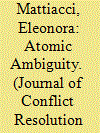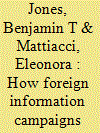| Srl | Item |
| 1 |
ID:
183695


|
|
|
|
|
| Summary/Abstract |
How does dual-use technology influence cooperation? This study explores how the development of nuclear latency (the technological precursors to nuclear weapons) affects U.S. cooperative overtures toward its possessors. We argue that the ambiguous nature of nuclear latency creates uncertainty about the intentions of its possessors and impacts cooperation. Using event data, we find that a state’s possession of overt lab-scale enrichment and reprocessing facilities is significantly correlated with greater cooperative overtures from the United States toward that country. These overtures may serve as effective tools to counter nuclear proliferation among these states. Yet, when latent states engage in a concerted effort to keep their facilities secret, both at the lab and a more advanced “pilot” stage, this relationship is reversed. These results carry important implications for the impact of emerging, dual-use technologies on international security broadly.
|
|
|
|
|
|
|
|
|
|
|
|
|
|
|
|
| 2 |
ID:
192877


|
|
|
|
|
| Summary/Abstract |
Governments involved in civil wars often seek to shape foreign perceptions of the conflict and of the government’s role in the conflict. To this end, for example, many such governments have engaged in public diplomacy campaigns (PDCs) in the United States since the end of the Cold War. Specifically, these governments have hired US public relations (PR) and lobbying firms to present favorable narratives of themselves and their role in the conflict. Through PDCs, governments seek to shape US public pronouncements about the governments and the conflict itself. Are PDCs effective tools to reach this goal? We argue that the effect of PDCs is divergent. PDCs help mobilize both supporters and opponents of the sponsoring governments. In so doing, PDCs increase both positive and negative public statements from US officials toward the civil war government. We compile data on PDCs in the United States since the end of the Cold War. Our results have implications for research on foreign influence in foreign policy, combatants’ moral hazard, and international norms about combatant behavior. Moreover, in order to gauge the influence of foreign actors on domestic narratives of civil wars, it is crucial to consider how such foreign actors can indirectly shape the discourse around conflict by mobilizing domestic factions.
|
|
|
|
|
|
|
|
|
|
|
|
|
|
|
|